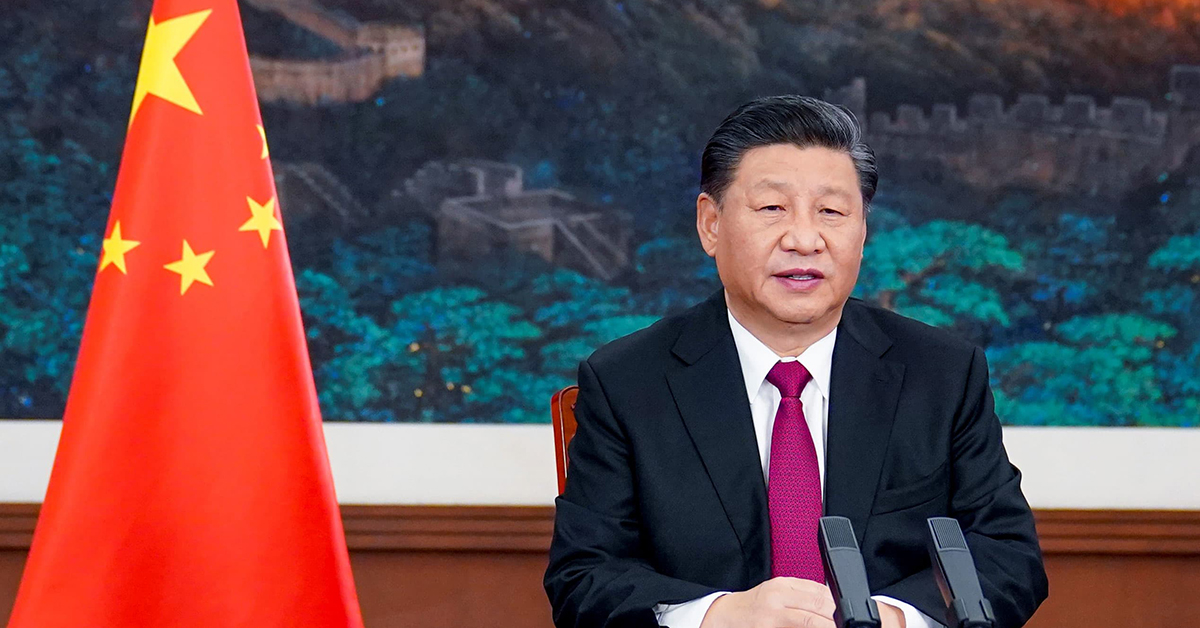Viking Bohman
Since Lithuania allowed a “Taiwanese representative office” to open in Vilnius in July, Beijing has been trying to force the Lithuanian government to back down from its new Taiwan-friendly policies. China has recalled its ambassador from Lithuania, downgraded the diplomatic status of the Lithuanian embassy in Beijing, restricted trade relations with the country and put pressure on international companies to limit their exchanges with the Lithuanian market. This gradually intensifying coercive diplomacy is unprecedented in scale, even if China has used similar methods before.
Events in Lithuania are part of a broader trend of friction in EU-China relations… This trend is unlikely to abate anytime soon, as there are no signs that China will start compromising on what it sees as its “red lines”, or that European countries will reduce their criticism.
Up until last month, it seemed as if Lithuania could withstand the pressure without major economic problems. Only a small part of Lithuania’s exports go to China, and Lithuanian government officials said in early December that even a complete halt to trade, which at the time seemed to be one of the worst-case scenarios, would only have a minor impact on the economy. But since then, China has gone further than many observers had initially expected, by expanding trade restrictions and pressuring multinational companies like Continental to stop buying components from Lithuania.
It is still unclear whether China will confront companies with an ultimatum that would allow them to trade only with either the Lithuanian or Chinese market. Nonetheless, the situation could become unsustainable for Lithuania if companies and investors begin to withdraw from the country. The German-Baltic Chamber of Commerce recently sent a letter to the Lithuanian government stating that German investors may be forced to close their factories in the country if a solution to the conflict is not found.
A couple of weeks ago, political rifts seemed to emerge in Vilnius when the Lithuanian president said that it had been a mistake to allow the representative office to bear the name “Taiwanese”. If Lithuania were forced to back down, the episode could become a dismal warning to others that the pressure China can exert is too great for a smaller EU country to bear. A French representative recently expressed hopes that the EU could soon adopt measures in support of Lithuania, but there have been no signs of agreement on concrete action thus far.
Events in Lithuania are part of a broader trend of friction in EU-China relations. Many EU countries are showing a greater willingness to support China-critical positions on questions related to human rights, Hong Kong and Taiwan, despite strong reactions from Beijing. This trend is unlikely to abate anytime soon, as there are no signs that China will start compromising on what it sees as its “red lines”, or that European countries will reduce their criticism.
Chinese leaders are probably watching developments in Europe with some concern. If Lithuania can successfully maintain its new policy on Taiwan despite pressure from China, who says other countries cannot do the same? Beijing seems to be doing everything its power to prevent that from happening, even if it hurts China’s reputation and leads to a further deterioration in its relationship with the EU.
Justyna Szczudlik
China’s tensions with Lithuania are a continuation rather than the beginning of changes in the PRC’s relations with Europe. EU-China ties have been continuously worsening since 2016, along with Beijing’s attempts to engage in European high-tech and critical infrastructure as an implementation of Made in China 2025 and BRI. These have served as alarm bells and as a result have hardened the EU’s stance on China.
China has crossed a red line, deploying potentially deleterious retaliatory measures. This is a novelty in Europe.
However, China’s dispute with Lithuania opens a new chapter in Europe-China relations. In short, China has crossed a red line, deploying potentially deleterious retaliatory measures. This is a novelty in Europe. So far, China’s means to achieve its goals towards Europe – preserving the EU’s longstanding status quo on China such as open Europe for the PRC economically and silent Europe on normative issues and “core interests” – was using predictable carrots and sticks.
Carrots were mostly economic, while sticks were rather soft and political-oriented. Good examples of carrots were incentives in the form of better market access (e.g. without joint ventures requirements) for companies that wanted to invest in China. The latest example is the Comprehensive Agreement on Investment (CAI): commitments to give large European enterprises (mostly German & French) more leeway in doing business in the PRC.
Sticks were mostly political signals such as the cooling or freezing of political dialogue (see Poland after the Dalai Lama’s visit in 2008, or Norway after awarding the Nobel Peace Prize to Liu Xiaobo in 2010) or verbal threats of “paying a heavy price” (e.g. Czech Senate delegation trip to Taiwan in 2020) that in fact were lip service. Even economic coercion was rather narrowly targeted, limited to a few products or sectors, such as restrictions imposed on the import of Norwegian salmon that were not very adverse for the country’s economy.
In the case of Lithuania, the situation is entirely different. China’s punitive measures serve as a formidable weapon potentially harmful not only for Lithuanians and country’s economy, but also the EU’s market due to the interdependence of supply chains. China decided not only to lower diplomatic relations to charge d’affairs but also delisted Lithuania from its customs country list. Because bilateral economic bonds are shallow, China started to threaten multinationals cooperating with or operating in Lithuania and in the PRC.
In fact, it was a message sent to Germany as a significant investor in Lithuania and China, with enormous decision-making “weight” in the EU, to serve as a proxy to compel Lithuania to make it resign from its Taiwan-friendly approach. Otherwise, Germany (and others) could be affected.
What might be the broader consequences of China’s coercion? Firstly, this is a palpable example that China might be an imminent threat for Europe, both for countries with shallow and deep economic ties with Beijing. China may use dependencies (both direct and indirect) as a real weapon. In fact, the real “depth” of economic ties and whether threats would be implemented do not matter much – there is a growing uncertainty around doing business in/with a “targeted” country. Potential investors may see the country as a problematic partner, and think twice about whether their existing investments in China will be affected.
Secondly, the Lithuanian case shows that China may have an impact on the domestic situation in third countries, for example initiating internal divisions by proxy. The Lithuanian president’s remarks against naming the representative office as “Taiwanese”, Lithuanian business’ calls for the government to moderate the country’s approach to China, and the majority of Lithuanians that do not support the government’s China policy are good examples.
Thirdly, this is also an example of a potentially effective way to create divisions in the EU. Germany’s initial hesitation over whether to kowtow under China’s pressure is very telling. This is a food for thought when considering if the notion of EU re-engagement with China – that is reappearing in Brussels – is the right one.
Fourthly, despite the fact that China’s tensions with Vilnius may serve as a freezing effect for other countries, the growing distrust, even if not openly voiced, is a fact.
Although the EU will not resign from cooperation with China whatever happens, Beijing’s latest steps so far unite Europe. Eventually Germany (despite pressure from its business) backed Lithuania, and France during its current EU’s presidency will be fast-tracking legislation of anti-coercion instrument. Europe should be prepared for more of China’s new punitive actions. The latest strife has only worsened the mutual distrust. This trend will be deepening.
Mariah Thornton
Beijing has maintained certain red lines within its foreign relations, one of which is Taiwan. Lithuania is no exception, nor does it indicate a significant shift in China’s approach to Europe more broadly speaking.
To understand this, we need only look back to one of first major flashpoints over the so-called ‘Taiwan question’ in recent history. In 1995, Taiwan’s then President Lee Teng-hui visited the US to deliver a speech at Cornell University. This sparked the Third Taiwan Strait Crisis. In the eyes of the Chinese leadership, the visit was an endorsement from Washington of Taiwan’s independence and a clear violation of the One China Policy. For Beijing, this warranted a strong response: launching missiles into the Taiwan Strait.
The question is not whether China’s relationship with Europe has shifted, but whether Europe’s relationship with China has shifted.
In this context, the response to Lithuania’s rapprochement with Taiwan appears consistent. In addition to Lithuania, Taiwan currently has 28 other de facto embassies across Europe. These 28 embassies notably do not contain ‘Taiwan’ in their formal titles, opting instead for ‘Taipei Representative Office’ or the more innocuous ‘Taipei Economic and Cultural Representative Office’. However, Lithuania’s decision to establish a Taiwan Representative Office was a red line for Beijing. Much like the 1995 incident, this signified Vilnius’s support for Taiwanese independence and therefore a violation of the One China Principle.
The case of Lithuania was not an isolated incident in Europe. A similar pattern has unfolded in China’s relations with the Czech Republic. Prague became a target after the city’s mayor Zdeněk Hřib concluded an agreement in January 2020 which formalised Taipei and Prague’s status as sister cities and effectively ended a similar arrangement with Beijing. Mayor Hřib also expressed support for Taiwan by meeting President Tsai Ing-wen and backing the island’s participation in the World Health Organization (WHO). Beijing retaliated in a number of ways: cancelling the Prague Philharmonic Orchestra’s upcoming tour of China, refusing to send pandas to the city’s zoo, and threatening restrictions on the number of Chinese tourists allowed to visit the Czech Republic.
Beijing’s red line on Taiwan has therefore remained consistent in its relationship with the EU. What is changing is Europe’s approach to China. We have witnessed a more hawkish turn in EU policy toward China in recent months. This has been accompanied by a warming of relations with Taiwan. Not only have European countries voiced unprecedented support for Taiwan’s participation in the WHO since the outbreak of COVID-19, but they have also donated vaccines to Taiwan. The question is therefore not whether China’s relationship with Europe has shifted, but whether Europe’s relationship with China has shifted.
Grzegorz Stec
The Lithuania-China dispute doesn’t overhaul the EU’s and China’s fundamental assessment of their relationship, but it vindicates concerns, exacerbates mutual distrust and solidifies a more contentious trajectory. It may not bring about an immediate shift in policies, but it is likely to facilitate a shift in decision-makers’ thinking.
If anything, Beijing’s spat with Vilnius and its growing, at times excessive, assertiveness, is going to make the EU double down on the development of its defensive policy toolbox and efforts to diversify its relations in Asia.
The dispute revolves around issues that both sides set as red lines. Beijing sees Lithuania’s moves towards Taiwan as a breach of its One China Principle, which opened a Pandora’s box of how the EU27’s One China Policy compares to Beijing’s principle. In turn, the EU cannot accept how China disrupted and weaponised the functioning of its single market, a fundamental aspect of the European integration.
But a policy shift has not taken place – at least, not yet. Based on recent diplomatic exchanges, it’s now clear that neither side wants the relationship to derail. The EU27 foreign ministers and the EU’s High Representative Josep Borrell voiced their opposition to Beijing’s coercion against Lithuania at a recent informal meeting in Brest. However, member states didn’t agree on concrete countermeasures and hinted at their interest in exploring ways to de-escalate the situation. The Chinese diplomats courted several European capitals including Paris, Berlin, Warsaw and Tallin in an attempt to show that the EU-China relations at large are not in a freefall. The interest in an overhaul of the EU-China relations remains scarce on both sides.
Yet, there is ample room for the conflict to escalate further as Slovenia is considering following in Lithuania’s footsteps and expanding its relations with Taiwan. Should Beijing target Ljubljana with measures of similar severity as those deployed towards Vilnius, this would further narrow the room for de-escalation manoeuvres. And that space is already narrow as 41 MEPs recently signed a letter calling for strong EU countermeasures to Beijing’s economic coercion, a new European Parliament’s resolution on Hong Kong and decisions to boycott the Beijing Olympics by several EU states.
The situation highlights the urgent need for the EU to adopt the anti-coercion instrument that would provide the bloc with a clear, legal, operational framework to respond to this type of economic coercion and act as a deterrent against such actions. However, getting the instrument in place is still going to take months. In the meantime, the EU should explore a political-level response that would aim to cushion the impact of Beijing’s measures and clearly refute China’s economic coercion.
That may lead to downturn in bilateral relations but doesn’t have to amount to a full-fledged shift in China policy – the member states remain committed to their multifaceted approach to China. But competition and systemic rivalry continue to increase relevance in the member states assessment of their relationship with China. If anything, Beijing’s spat with Vilnius and its growing, at times excessive, assertiveness, is going to make the EU double down on the development of its defensive policy toolbox and efforts to diversify its relations in Asia.
This article gives the views of the authors, and not the position of the China Foresight Forum, LSE IDEAS, nor The London School of Economics and Political Science.





